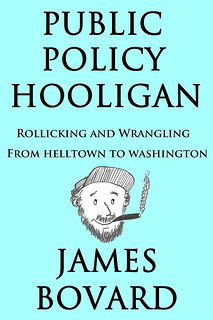 In my wayward youth, I worked one season as a Santa Claus at a Filene’s Department Store in Boston. I wrote up that escapade for the Wall Street Journal in 2011. This piece is an outtake from Public Policy Hooligan – which includes some other details of that gig not fit for a family newspaper.
In my wayward youth, I worked one season as a Santa Claus at a Filene’s Department Store in Boston. I wrote up that escapade for the Wall Street Journal in 2011. This piece is an outtake from Public Policy Hooligan – which includes some other details of that gig not fit for a family newspaper.
The illustration to the left was not used in WSJ. It was created by Tom Blanton, the mastermind of the Project for a New American Revolution.
Wall Street Journal, December 22, 2011
Confessions of a One-Season Santa Claus
by James Bovard
In the fall of 1977, I moved to Boston seeking literary triumphs and intellectual stimulation. As a 21-year-old college dropout from the mountains of Virginia who had just sold his first article, I assumed I could easily rack up more sales in the big city. But my submissions struck out everywhere, and the financial wolves were soon howling at my door. After seeking refuge in the Boston Globe’s Help Wanted ads, I found myself front and center at a Santa Claus prep session run by the Western Temporary Services.
After completing the 28-minute training program, I was dispatched to a Filene’s department store in the distant south suburbs where I met the Boss Lady from Hell. She looked me over, grimaced, snorted and growled: “I hope you’re not like those Santas that damn temp agency sent last year.”
“Why? What’d they do?” I asked.
“The first one was a drunk who would sneak into the bathroom and hit his flask and then drool on kids while slurring the names of his reindeer. The second pranced around like he was Peter Pan. The third was the worst—he seemed perfectly normal till he dropped trousers with a hundred kids watching.”
I made a note to double check the belt on the Santa outfit.
Boss Lady greeted me every day with the traditional Boston “Howahya? . . . LISTEN!!! I don’t like the way your hair looks under the wig! And I thought I told you to shave that red beard. And don’t be snacking while you’re on the job. Now, get out there and look jolly.”
I worked as a restaurant Santa, circling the dining room and visiting families as they munched their mediocre cuisine. After getting kids to recite their Christmas gift wish list, I handed them a little bag of goodies. It was holy writ to never promise that a child would receive a specific gift, else Filene’s would suffer the parents’ undying wrath.
This was my first and only experience being a minor deity. As I approached, some kids would jump up and down in their seats, and if there were two or more children at the same table they often had shouting contests.
But not all the children treasured their visit with Santa.
I walked up to one agitated 4-year old, blond-haired girl hunkered down in her chair and clutching the arm rests like a life raft. When I leaned over and asked what she wanted for Christmas, she gritted her teeth: “I want you to leave.”
One evening, I saw a dark-eyed, dark-haired, 7-year-old boy standing in the entrance staring at me like he’d seen a ghost. I stopped and gave him the biggest grin of the night. “Santa, you have a weird laugh,” he sputtered as he clung to his mother’s skirt.
The boy had a point. My laugh has always been rambunctious and it became rowdier when I occasionally slammed down a beer or two before commencing Claus work. It wasn’t my fault that the happy hour at the nearby pub commenced just before my shift started. The same laugh that spooked some young Bostonians got me ejected almost 20 years later from the Supreme Court press box.
Toward the end of my final night on the job, the high-strung assistant restaurant manager—who had almost fired me the previous night after she caught me poaching a piece of apple pie—signaled to follow her to the soda fountain section of the restaurant, far from the prevailing hubbub, for a special guest. As I readied the jollity, Boss Lady Jr. tapped me on the shoulder: “The little girl is blind.”
There sat two of the most tranquil people I had seen the entire holiday season. The mother was resting her left hand lightly on her daughter’s shoulder. The little girl looked to be 6 or 7 years old, with light brown hair and a gentle smile that bloomed across her face when her mom announced, “And here comes Santa Claus.”
I encouraged the girl to touch the fake Santa beard. Unlike some kids, she did not attempt to yank it off as if she were capturing the enemy’s flag.
I have forgotten what she requested for Christmas, but it was reasonable. She didn’t ask for a pony and a French au pair and every Barbie doll and accessory produced since 1957.
Speaking softly, I described some of the Christmas decorations in the restaurant. She seemed to enjoy my comments, so I rattled on about the meaning of Christmas. I had seen a lot of warmth between parents and children that season, but the bond between this mother and daughter was more precious than any other. There was such a radiance from her mother’s love, I knew that girl would have a wonderful Christmas.
Visiting with that mother and daughter rejuvenated my holiday spirit in a way that a bowl of spiked egg nog never could. In later decades, when the Christmas season sometimes seemed burdensome or hollow, thinking back on that pair has helped put a sparkle back in my eyes. And I count my blessings that I no longer have to don a garish suit, false whiskers and a stuffed pillow to rake in $3.50 an hour frightening children with my laugh.
Excerpted from Public Policy Hooligan – available on Kindle here –

Now that readers of The Hill have exposed you as a Russian Agent, I am wondering if you used the trusted position of Santa to indoctrinate children with commie dogma in order recruit them into the communist underground. Maybe it is time for Special Counsel Mueller to investigate how many of the kids that sat in your lap went on to retweet mind control messages from Russia designed to elect Trump. While Mueller is at it, he should conduct a probe into the origin of those fancy cigars you smoke. Are those stogies commie cigars from Havana paid for with Russian Rubles?
Thanks, Tom. I suspect his probe of my fancy cigars would turn up as much evidence as his investigation of Russian collusion. As a member of the National Writers Union, I am prohibited from smoking Cuban cigars – or any other stogies that cost more than $1.45. The cigar in the picture clocked in at $1.25, so I don’t have to worry about a disciplinary hearing from the union.